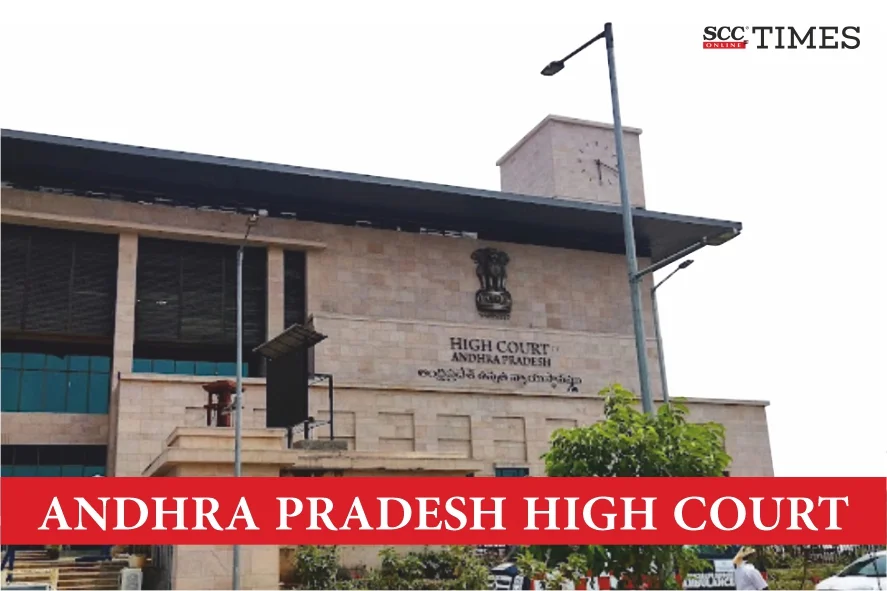Andhra Pradesh High Court: In a set of anticipatory bail petitions filed under Section 482 of the Bharatiya Nagarik Suraksha Sanhita, 2023 (BNSS), the petitioner seeks relief in six connected criminal cases registered across various police stations in Andhra Pradesh, Nyapathy Vijay, J., held that in order to maintain consistency, disposed of criminal petitions and directed the Station House Officers concerned to follow the procedure as contemplated under Section 35(3) of BNSS (Section 41-A Criminal Procedure Code).
The common thread running through these FIRs is his alleged orchestration of derogatory and abusive posts on social media targeting rival political leaders holding constitutional posts. The Petitioner is alleged to be in charge of the social media wing of the political party YSR Congress Party (YSRCP), and it is claimed that the abusive posts were made at his behest by others who were remunerated to do so. The Petitioner was implicated as accused 1 or 2 in all cases.
A complaint was lodged as crime No. 263/2024 at Gudivada II Town Police Station on 03.11.2024 by one complainant against Accused 1 for allegedly posting abusive content online. Initially, the individual accused of posting was named A.1. However, during the course of investigation, it was alleged that the petitioner had paid A.1 on behalf of a political entity, leading to the petitioner being arrayed as Accused 1. The offences invoked include Sections 192, 196, 336(4), 340(2), 353(2), 79, 111(2)(b) of the Bharatiya Nyaya Sanhita (BNS) and Section 67 of the Information Technology Act, 2000. Another complaint was filed by one individual against Accused No.1 alleging that A.1 had confessed to having acted upon payment received from the petitioner and others, purportedly on behalf of the same political party. Based on the confession, the petitioner was implicated as A.1. The offences invoked include Section 196 of the BNS and Sections 66 and 67 of the Information Technology Act, 2000, along with additional BNS provisions added during investigation.
Another complaint was filed by another informant against Accused No.1 allegedly confessing to acting under the instructions or inducement of the petitioner, leading to the latter’s implication as A.1. The offences invoked comprise various provisions of the BNS along with Section 67 of the Information Technology Act, 2000. Another complaint was filed against Accused No.1, and the petitioner was later named Accused No.2, based on materials unearthed during investigation. The offences alleged include provisions of the BNS and Sections 66E, 67, and 67A of the Information Technology Act, 2000. One more complaint was filed against Accused No.1. The co-accused’s confession led to the petitioner’s implication as Accused No.2. Offences involved include Sections 353(1)(c), 353(2), 192, 111(2)(b) of the BNS and Section 67A of the Information Technology Act, 2000. Another complaint was made against Accused No.1, and upon confession of the said accused, the petitioner was implicated as Accused No.2. The offences cited include several sections of the BNS and Section 67 of the Information Technology Act, 2000.
Thus, the petitions arose due to the petitioner being implicated in multiple FIRs based on the custodial confessions of various co-accused who were alleged to be social media account holders paid to post abusive political content. The allegations are that such content was systematically created and disseminated under the guidance and financial influence of the petitioner acting on behalf of YSRCP. Based on these accusations, the Petitioner feared arrest and sought anticipatory bail under Section 482 BNSS.
The prosecution also emphasized that the abusive content continued both before and after the BNS was enacted, and thus Section 111 could be invoked.
The central issue was whether the petitioner was entitled to anticipatory bail and, specifically, whether Section 111 BNS would bar the issuance of notice under Section 35(3) BNSS. The Court noted that, barring Section 111, all the offenses attributed to the petitioner carry a maximum imprisonment of seven years and would ordinarily invoke the safeguard of Section 35(3) BNSS, requiring notice prior to arrest.
However, the bar under Section 35(3) arises only if Section 111 applies. The Court observed that it had already disposed of four similar petitions by the Petitioner, wherein both parties had consented that the petitioner be issued notice under Section 35(3) BNSS before any arrest. Given the similarity in facts and issues and considering that those cases were heard as part of a batch along with the present petitions, the Court found it appropriate to follow the same course of action in these petitions.
The Court held that the petitioner shall be entitled to the protection of Section 35(3) BNSS, and any further action against him must follow the requirement of issuing a prior notice.
The Court directed the State Government to ensure that the right to dignified life of citizens is not infringed and a list of expletives, swear, militant words and words akin should be identified by the State Government and executive instructions should be issued in exercise of their power under the constitution, prohibiting usage of such words in social media.
[S Bhargav Reddy v. State of AP, 2025 SCC OnLine AP 1937, decided on 07-05-2025]
Advocates who appeared in this case:
Counsel for the Petitioner: Sri Ponnavolu Sudhkar Reddy, Senior counsel for Sri R. Yella Reddy
Counsel for the Respondent(S): Public Prosecutor


